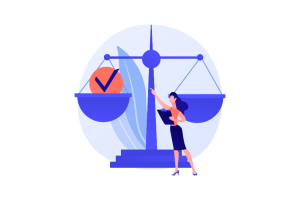
Source: Freepik
From automated decision-making to data protection and privacy issues, technological developments have a significant impact on society. Today, information and communication technologies have become a matter of course and indispensable in all areas of life. Ethics has long been an issue in business and the world of IT is also increasingly concerned with moral issues. In the context of artificial intelligence (AI) in particular, such conflicts are becoming increasingly prominent. In today’s blog post, we want to shed light on ethical influences in the IT sector.
Ethics and IT
Hi, I’m Malak Mostafa, HiWine in Marketing and Event Management at the IT Center. I study philosophy at RWTH Aachen University and in the course of my studies I deal intensively with ethical dilemmas and moral issues. In the course of my time at the IT Center, I have repeatedly discovered which moral questions can also arise in the IT world. Technological developments also bring with them ethical challenges. I have therefore addressed various aspects of ethics in IT in this blog post. Of course, a single blog post cannot fully illuminate the interface between IT and ethics. Nevertheless, we would like to address the topic as it is becoming increasingly important.
Secure and Fair IT
One of the most important issues in this context is the responsible handling of data. In our world, personal digital information is frequently collected and analyzed. It is crucial to respect the privacy and rights of users. Ethics in IT therefore means not only guaranteeing data protection and data security, but also ensuring that consent has been given for its use and storage. In the IT-Security category, we repeatedly draw your attention to security risks and explain how you can use information technology more consciously.
Another important aspect is fairness in the development and use of technology. AI and algorithmic decision-making systems can lead to certain groups being disadvantaged if they are based on prejudices or discriminatory assumptions. Ethics in IT therefore requires that these systems are designed fairly and transparently to avoid discrimination.
Questions of responsibility also play an important role. Who is responsible if an autonomous machine makes a mistake or an algorithmic system makes a wrong decision? Ethics in IT requires that clear responsibilities are defined and accountability mechanisms are introduced to ensure that technology is used responsibly.
Ethical Principles
One well-known principle, for example, is deontological ethics, which is based on moral duties and rules. It focuses on the fact that certain actions are morally right or wrong in themselves, regardless of the consequences they may have. This can include, for example, keeping promises, complying with data protection contracts or respecting human dignity. According to this approach, it is recommended that software developers and leaders consider the rules and principles that apply in their organization/industry and ensure that their actions meet the standards of deontological ethics.
In addition, ethical principles such as fairness, transparency and accountability also play an important role in IT decisions. These principles include, for example, avoiding discrimination and bias in algorithms, promoting open source principles and considering the impact on society and the environment. Fairness requires that decisions are made fairly and without discrimination, while transparency means that decision-making processes should be open and comprehensible. Accountability, in turn, involves taking responsibility for the impact of decisions made and being prepared to make corrections where necessary.
Safe and Fair Artificial Intelligence
One example of the application of ethical considerations in the IT decision-making process is the development and implementation of AI algorithms. Here, developers should ensure that the algorithms are fair, transparent, free from bias and respect the privacy and rights of users. This requires a thorough analysis of the potential impact on society and the involvement of various stakeholders in the decision-making process, including users, data protection officers, digital ethics experts, as well as representatives from politics and society. Possible consequences can vary, such as violations of data protection, discrimination, social inequalities and the environmental impact of the energy consumption of IT systems.
Overall, the integration of ethical considerations into the IT decision-making process is crucial to ensure that technological developments are in line with moral principles and societal values. By applying ethical principles and considering fundamental ethical principles, IT decision-makers can help promote ethically responsible and sustainable use of technology.
[1] HDM Stuttgart
Responsible for the content of this article are Janin Iglauer and Malak Mostafa..





Leave a Reply